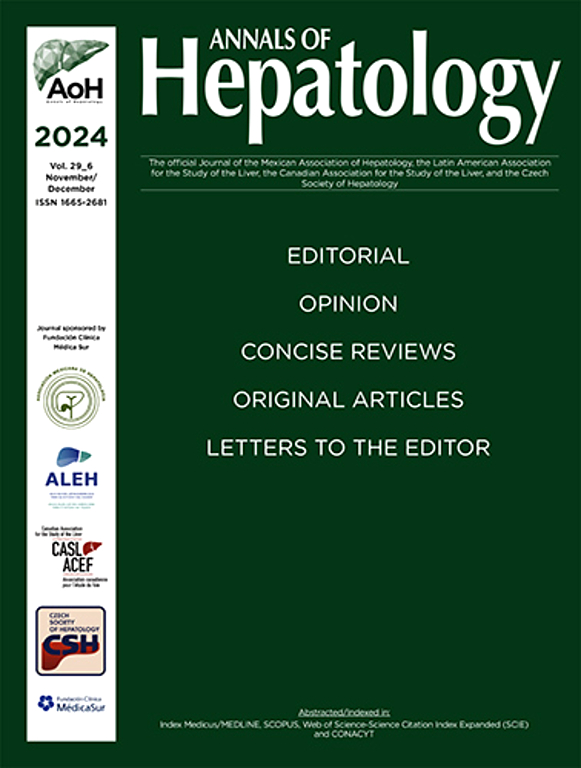在韦拉克鲁斯高级专科医院肝炎门诊治疗丙型肝炎孕妇的经验
IF 4.4
3区 医学
Q2 GASTROENTEROLOGY & HEPATOLOGY
引用次数: 0
摘要
目前,妊娠期丙型肝炎的治疗方案还不明确。典型的临床做法是孕妇在怀孕和哺乳后转诊和联系治疗;然而,在实践中,很少有成功的治疗。迄今为止,已经发表了三个病例系列,其中包括妊娠期丙型肝炎治疗的安全性结果。ACOG建议DAA只能通过临床试验开始,并且孕妇在服用DAA时应被告知继续治疗的风险和益处。报告HAEV肝炎诊所治疗3名妊娠后半期服用DAAs的HCV孕妇的经验,这些孕妇的持续病毒反应(SVR)至今未出现不良反应。患者和方法自2021年以来,报告了3例经病毒载量确诊的HCV感染孕妇。结果患者接受Sofosbuvir-Velpatasvir 400/ 100mg治疗90天,无围产期异常报告。随后在这对夫妇中实现了负病毒载量。只有一名患者报告了头痛和头晕的不良症状。经过监测,决定有计划地终止妊娠,以减少垂直传播的风险,并就正确的母乳喂养技术提供咨询,以停止母乳喂养。结论sofosbuvir - velpatasvir给药12周,对2例患者无不良反应,3例患者治疗时SVR均达到SVR,显示了治疗的有效性和安全性。这为公共卫生和母婴问题提供了一个解决方案,防止围产期传播。根据这些结果,我们建议评估其在类似病例中的使用,以期有助于根除HCV感染。本文章由计算机程序翻译,如有差异,请以英文原文为准。
EXPERIENCE IN THE TREATMENT OF HEPATITIS C IN PREGNANT PATIENTS AT THE HEPATITIS CLINIC OF THE VERACRUZ HIGH SPECIALTY HOSPITAL
Introduction and Objectives
Currently, HCV treatment options during pregnancy are not well-defined. Typical clinical practice is to refer and link pregnant women for treatment after pregnancy and breastfeeding; however, in practice, very few have completed successful treatment. To date, three case series have been published that include safety results for HCV treatment in pregnancy. ACOG recommends that DAAs be initiated only through a clinical trial and that pregnant women while taking a DAA should be counseled about the risks and benefits of continuing treatment.
To report the experience of the HAEV Hepatitis Clinic with the treatment of 3 pregnant women with HCV on DAAs during the second half of pregnancy with sustained viral response (SVR) and no adverse effects to the combination to date.
Patients and Methods
Since 2021, three cases of pregnant women with HCV infection confirmed by viral load have been presented. After evaluation and categorization as F0-F1 by FIB 4, they were treated with Sofosbuvir-Velpatasvir 400/100 mg for 90 days
Results
Patients were treated with Sofosbuvir-Velpatasvir 400/100 mg for 90 days, with no reports of perinatal abnormalities. The subsequent negative viral load was achieved in the pair. Only one patient reported headache and dizziness as adverse symptoms. After monitoring, a planned termination of pregnancy was decided to reduce the risk of vertical transmission, and counseling on proper breastfeeding techniques was provided to discontinue breastfeeding.
Conclusions
Sofosbuvir-Velpatasvir was administered for 12 weeks without adverse effects on the pair, and SVR was achieved at the time of treatment in the three treated patients, demonstrating the effectiveness and safety of the treatment. This provides a solution to a public health and maternal-fetal problem in our setting, which prevents perinatal transmission. Following these results, we propose evaluating its use in similar cases with the intention of contributing to the eradication of HCV infection.
求助全文
通过发布文献求助,成功后即可免费获取论文全文。
去求助
来源期刊

Annals of hepatology
医学-胃肠肝病学
CiteScore
7.90
自引率
2.60%
发文量
183
审稿时长
4-8 weeks
期刊介绍:
Annals of Hepatology publishes original research on the biology and diseases of the liver in both humans and experimental models. Contributions may be submitted as regular articles. The journal also publishes concise reviews of both basic and clinical topics.
 求助内容:
求助内容: 应助结果提醒方式:
应助结果提醒方式:


